广东省江门市第一中学2015-2016学年人教版高中英语必修三 Unit 1 Festivals around the world(单元复习课件) (共81张PPT)
文档属性
| 名称 | 广东省江门市第一中学2015-2016学年人教版高中英语必修三 Unit 1 Festivals around the world(单元复习课件) (共81张PPT) | 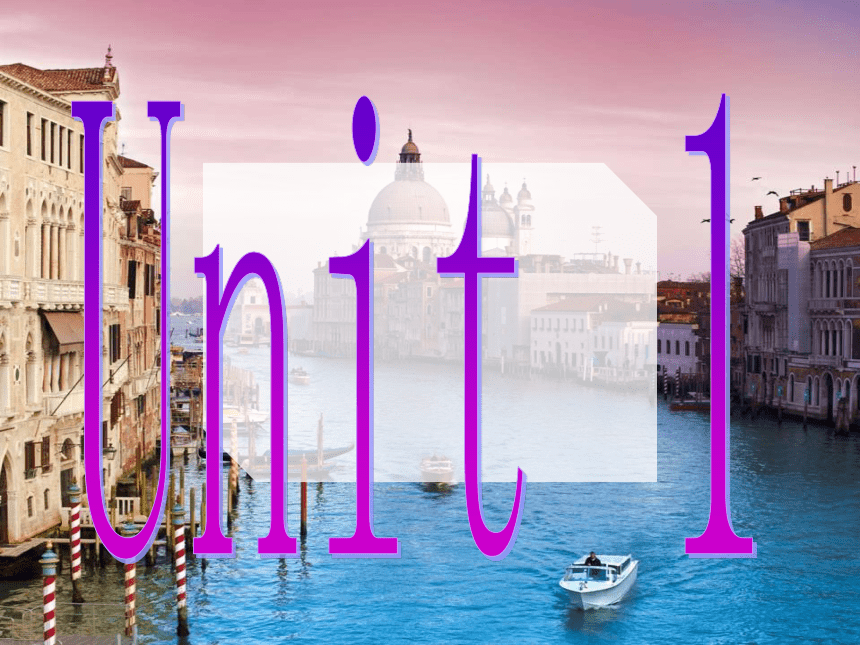 | |
| 格式 | zip | ||
| 文件大小 | 608.3KB | ||
| 资源类型 | 教案 | ||
| 版本资源 | 人教版(新课程标准) | ||
| 科目 | 英语 | ||
| 更新时间 | 2016-08-21 13:23:40 | ||
图片预览

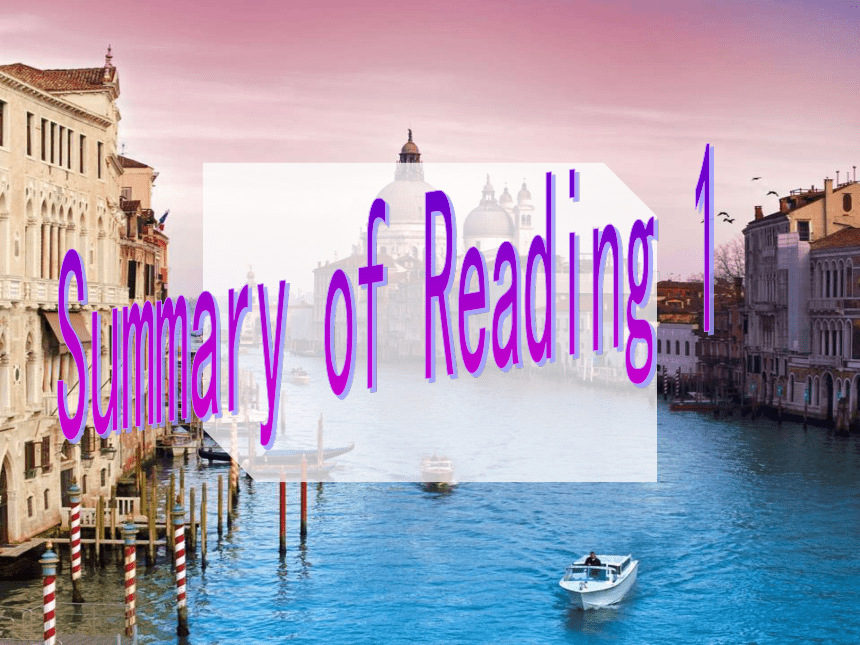
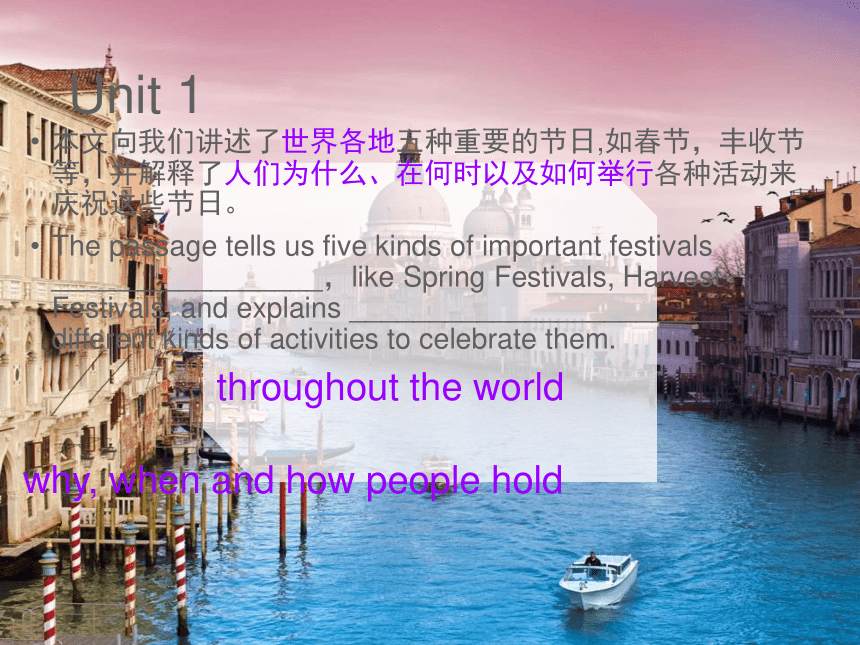
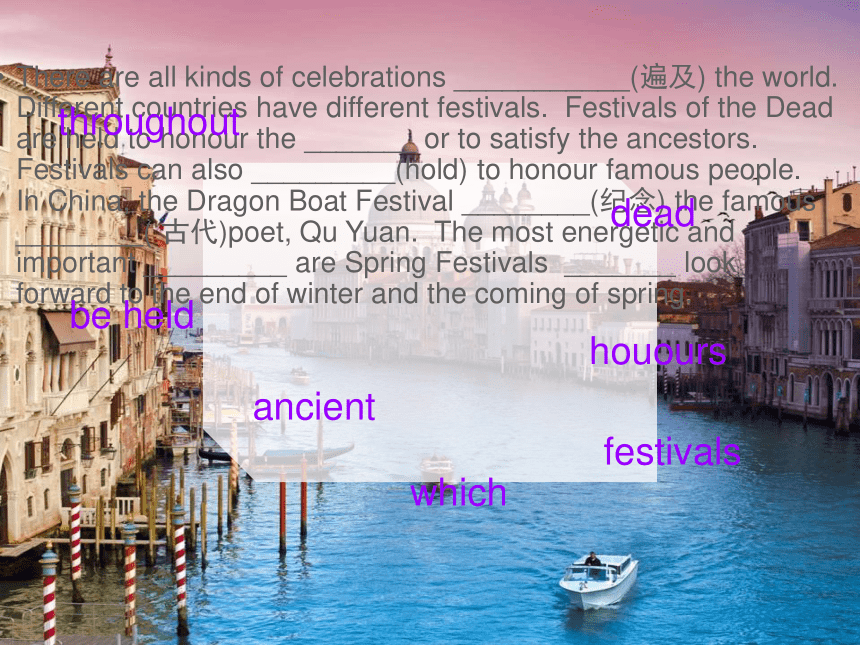
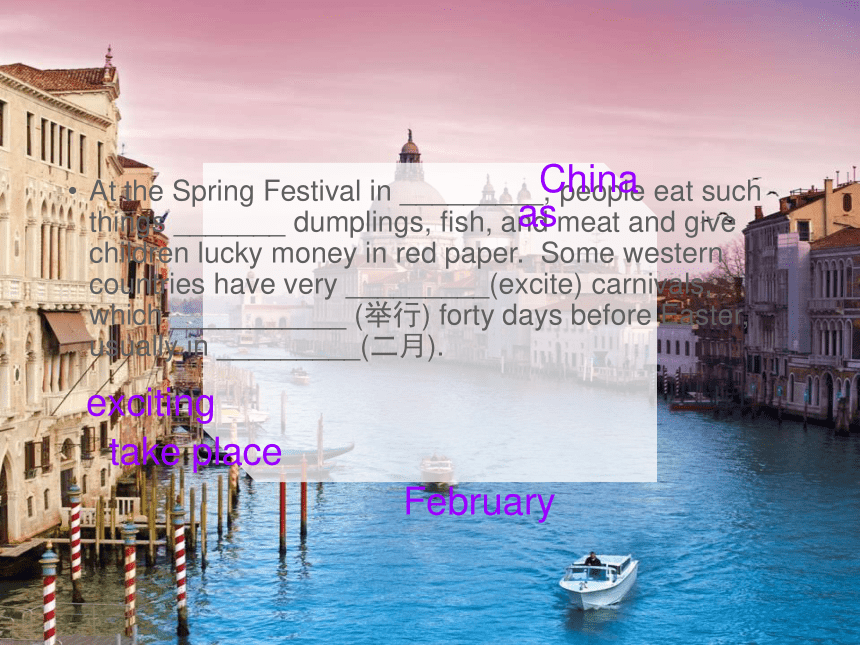
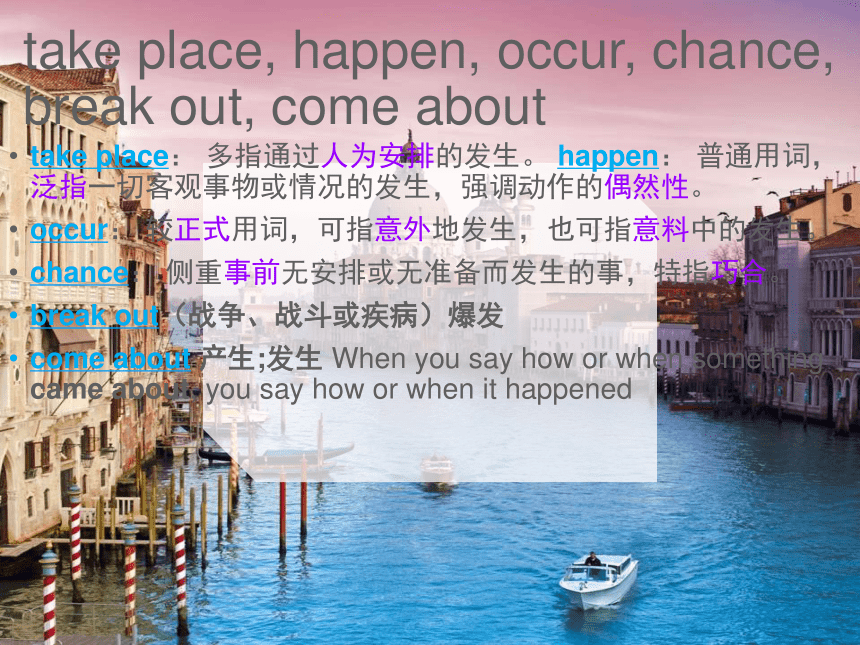
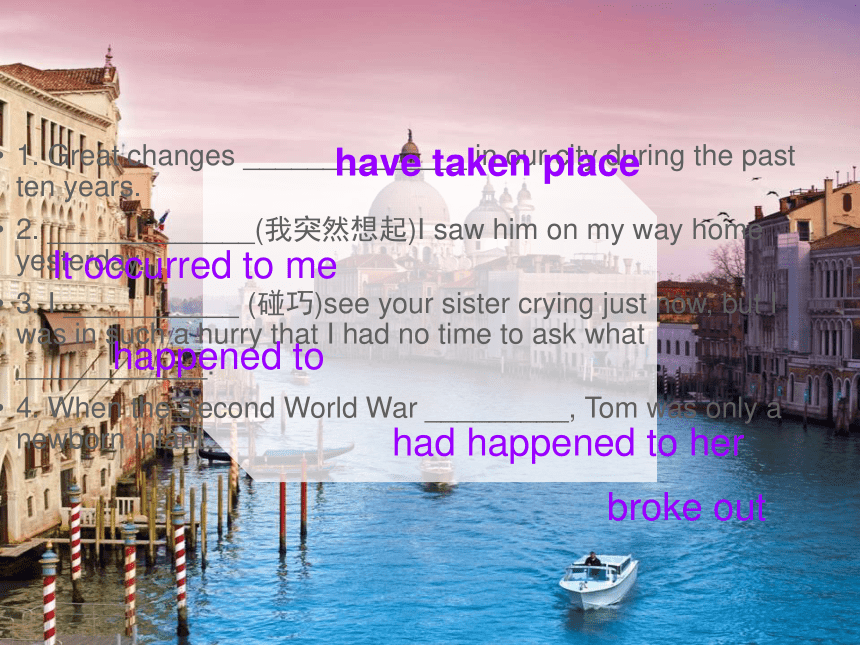
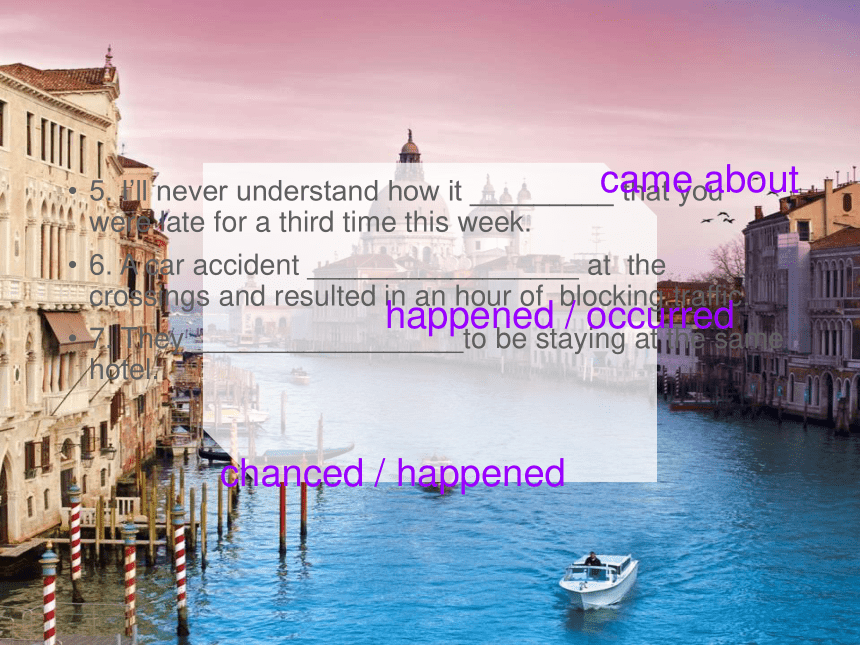

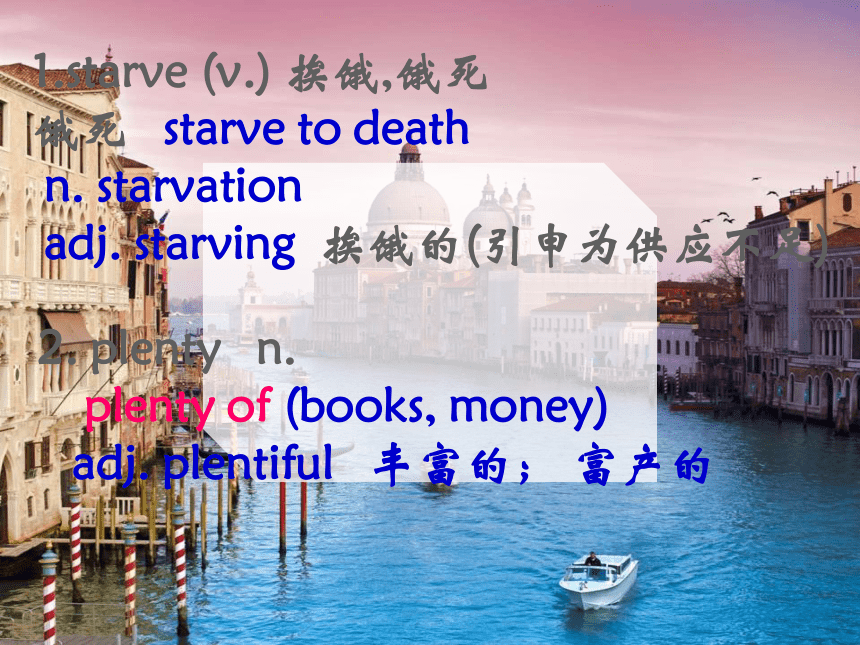
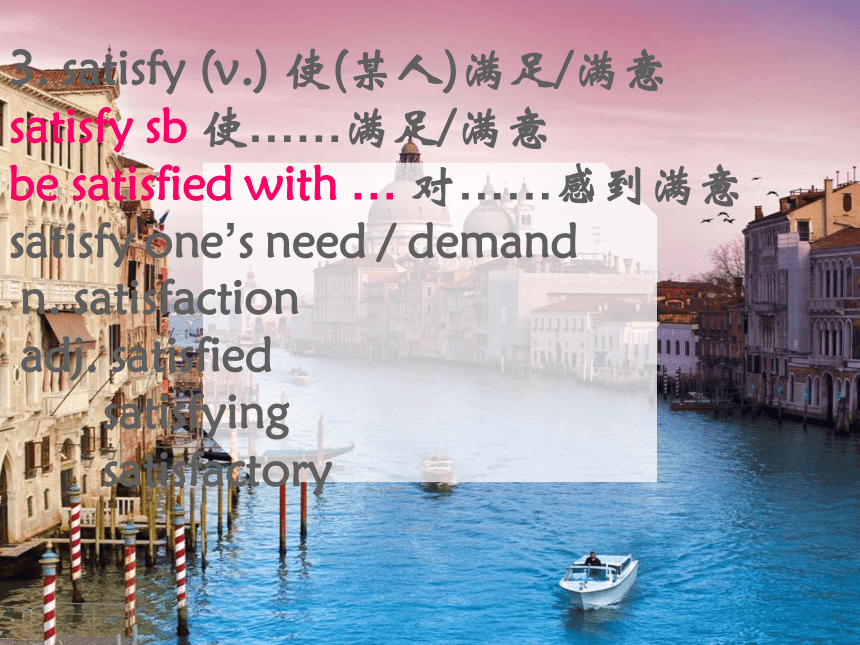

文档简介
课件81张PPT。Unit 1Summary of Reading 1Unit 1本文向我们讲述了世界各地五种重要的节日,如春节,丰收节等,并解释了人们为什么、在何时以及如何举行各种活动来庆祝这些节日。
The passage tells us five kinds of important festivals _________________,like Spring Festivals, Harvest Festivals, and explains ________________________ different kinds of activities to celebrate them.why, when and how people holdthroughout the worldThere are all kinds of celebrations ___________(遍及) the world. Different countries have different festivals. Festivals of the Dead are held to honour the _______ or to satisfy the ancestors. Festivals can also _________(hold) to honour famous people. In China, the Dragon Boat Festival ________(纪念) the famous ________( 古代)poet, Qu Yuan. The most energetic and important _________ are Spring Festivals _______ look forward to the end of winter and the coming of spring. throughoutdead be heldhouoursancientfestivalswhichAt the Spring Festival in _________, people eat such things _______ dumplings, fish, and meat and give children lucky money in red paper. Some western countries have very _________(excite) carnivals, which ___________ (举行) forty days before Easter, usually in _________(二月).
Chinaasexcitingtake placeFebruary take place: 多指通过人为安排的发生。 happen: 普通用词,泛指一切客观事物或情况的发生,强调动作的偶然性。
occur: 较正式用词,可指意外地发生,也可指意料中的发生。
chance: 侧重事前无安排或无准备而发生的事,特指巧合。
break out(战争、战斗或疾病)爆发
come about 产生;发生 When you say how or when something came about, you say how or when it happened
take place, happen, occur, chance, break out, come about1. Great changes ______________ in our city during the past ten years.
2. _____________(我突然想起)I saw him on my way home yesterday.
3. I ___________ (碰巧)see your sister crying just now, but I was in such a hurry that I had no time to ask what ____________.
4. When the Second World War _________, Tom was only a newborn infant.
have taken placeIt occurred to me happened to had happened to her broke out5. I’ll never understand how it _________ that you were late for a third time this week.
6. A car accident _________________ at the crossings and resulted in an hour of blocking traffic.
7. They _________________to be staying at the same hotel. came about happened / occurred chanced / happened exprssions and structuresstarve (v.) 挨饿,饿死
饿死 starve to death
n. starvation
adj. starving 挨饿的(引申为供应不足)
2. plenty n.
plenty of (books, money)
adj. plentiful 丰富的; 富产的
3. satisfy (v.) 使(某人)满足/满意
satisfy sb 使……满足/满意
be satisfied with … 对……感到满意
satisfy one’s need / demand
n. satisfaction
adj. satisfied
satisfying
satisfactory
She looked back on her career _______ great satisfaction.
a __________ explanation
a _____________ smile
a ____________ journey
to one’s _______________ with 满意地satisfactorysatisfying satisfiedsatisfaction4. lead (v./n.) (led, led)
v.) He led us out into the garden.
What led you to this conclusion?
We are leading a happy life.
The champion is leading by 2
seconds. (带路, 引领)(引导)(过……的生活)(领先)
条条大路通罗马.
All roads lead to Rome.
take the lead 领先,带头
lead n. 不可数 铅 (a soft, grey, heavy metal)
n. leader 领导
leading adj. 最重要的,最成功的
a leading role 重要角色,主要作用
5. in memory of 纪念……
有些节日是为了纪念一些著名的人物.
Some festivals are set up in memory of
famous people.
n.
memorandum便笺,备忘录
memory记忆,记忆力;回忆;存储[器]
remembrance记得,记忆
memorial [m?'m?:r??l]纪念碑,纪念物; 纪念仪式
v.
memorize记住,记忆
remember记住;[to]转达问候,代……致意,代……问好6. gain (v./n.)
gain nothing from talking too much.
gain confidence
增加信心
gain strength
增加力量
gain experience
增加经验
7. award (n./v.) n. 奖品,奖金,奖励
他赢得/被授予了这比赛的最高奖项.
He ______________________________
in the competition.
v. 颁发, 给予(奖品等)
award sb sth (for …)
(因为…)授予某人某物
n. awardee 受奖者
awarder 授奖者
won/ was given the highest awardaward, reward
这两个动词均有“给予奖励”之意。
award:侧重指官方或经正式研究裁决后对有功者或竞赛优胜者所给予的奖励。
reward:指对品德高尚和勤劳的人所给予的奖励。也可指为某事付酬金。(reward sb. with sth.)
adj. rewarding 值得的; 有报酬的
rewardless 无报酬的,徒劳的 8. turn ________ 到场,出现
要是他还不出现的话, 我们就不等他了.
________________________, we will go
without him.
Turn up the radio.
把……调大一些
转回身
返回,折回
拒绝,调小一些
交(上去)If he doesn’t turn up soonturn around
turn back
turn down
turn inup(使)变为
关上
打开
结果是……
移交,翻身
向(某人)求助turn into
turn off
turn on
turn out
turn over
turn to9. keep one’s word / promise
守信用,履行诺言
break one’s word / promise
不守诺言
adj. wordless 无话的,沉默的
wordy <贬>冗长的; 唠叨的beyond words
have a word with…
in a word
in other words
in words
word for word无法用言语形容
和……说话
总之
换句话说
用言语
逐字逐句地10. ________ one’s breath 屏气
上气不接下气
___________ breath
vi./ vt.
breathe (through your nose)
breathe something / a word about…
吐露,说出holdout of
adj. breathless
英 [‘breθl?s] 气喘吁吁的,气绝的
adj. breathtaking [‘br?θ’tek??]
非常激动人心的; 使人透不过气来的
11. apologize(v.) 道歉
apologize to sb for sth
因为……而向某人道歉
他因为迟到而向老师道歉.
He apologized to the teacher for
being late.
n. apology 道歉,歉意[C]
__________ an apology
apologizer 辩护者,道歉者 makestructuresSentence Structures1.很明显咖啡老板在等者李方离开.
It was obvious that the manager of the coffee shop was waiting for Li Fang to leave.
1)我们每两周聚会一次是必要的.
2)他成功了是不足为奇的.
3)据说意大利发生了一次大地震.
4)真奇怪,这么重要的会议,他居然缺席.
5)他竟然向我们撒谎,真是可耻.
6)据报道,双方的会谈有进展.1)我们每两周聚会一次是必要的.
1)It is necessary that we meet every two weeks / every second week / every other week.
2)他成功了是不足为奇的.
2)It is no wonder that he should have succeeded.
3)据说意大利发生了一次大地震.
3)It is said that there has been a big earthquake in Italy.
4)真奇怪,这么重要的会议,他居然缺席.
4)It was strange that he should have been absent from such an important meeting.
5)他竟然向我们撒谎,真是可耻.
5)It was a shame that he should have lied to us.
6)据报道,双方的会谈有进展.
6)It is reported that the talks between the two sides are making progress.
It is clear / necessary / important / strange / natural…that…
It is a pity / a shame / no wonder …that…
It is said / believed / reported / expected / known…that…2.现在的节日有很多由来,一些是宗教上的,一些是季节性的,一些是纪念特殊的人或事件的.
Today’s festivals have many origins, some religious, some seasonal, and some for special people or events.
我非常荣幸有机会和这么多优秀的同学一起学习,有些非常热心,有些非常勤奋,有些非常善良.
It is an honor for me to have the chance to study with so many excellent students, some warm-hearted, some diligent and some kind.
3.在印度,10月2日是纪念莫罕达斯·甘地的全国性节日,他是帮助印度脱离英国统治而获得独立的领袖.(名词+同位语+定从)
India has a national festival on October 2 to honour Mohandas Gandhi, the leader who helped gain India’s independence from Britain.
我忘不了布朗夫人,她是我的英语老师,在我感到沮丧的时候她总是鼓励我挑战自己.
I will never forget Mrs Brown, my English teacher who always encouraged me to challenge myself when I was disappointed.4.最富生气而又最重要的节日,就是告别冬天,迎来春天的日子.
The most energetic and important festivals are the ones that look forward to the end of winter and to the coming spring.
最有经验最有益的老师是那些不仅教给我知识的人而且还是教我们如何获得知识的人.
The most experienced and helpful teachers are the ones who not only offer us knowledge but also tell us the way how to gain knowledge.
vocabularyWords & Phrases1.饶恕
2.使…想起…(phr.)
3.提醒
4.出发,使爆炸(phr.)
5.广播员,告制者
6.哭泣
7.喜鹊
8.银河
9.牧群,兽群
10.编织,使迂回前进1.forgive, forgave, forgiven
2.remind…of…
3.remind
4.set off
5.announcer
6.weep, wept, wept
7. magpie
8. the Milky Way
9.herd
10.weave, wove, woven
11.擦
12.明显的
13.悲哀
14.淹没,溺死
15.道歉
16.屏息(phr.)
17.守信用(phr.)
18.出现(phr.)
19.圣瓦伦廷节,情人节
20.停车场11.wipe
12.obvious
13.sadness
14.drown
15.apologize
16.hold one’s breath
17.keep one’s word
18.turn up
19.Valentine’s Day
20.parking lot21.样子,时尚
22.语言,预告(n.)
23.许可(n.)
24.必要性,需要
25.愚人,傻的,开玩笑
26.玫瑰花蕾
27.遍及全世界的
28.习惯,风俗
29.玩得开心(phr.)
30.好像(phr.)21.fashion
22.prediction
23.permission
24.necessity
25.fool
26.rosebud
27.worldwide
28.custom
29.have fun with
30.as if / as though31.开花
32.樱桃(树)
33.基督徒,基督教的
34.衣服
35.日夜,整天
36.游行,阅兵,检阅
37.复活节
38.月的,阴历的
39.狂欢节,嘉年华
40.期望(phr.)31.blossom
32.cherry
33.Christian
34.clothing
35.day and night
36. parade
37.Easter
38.lunar
39.carnival
40.look forward to…
41.充满活力的
42.赞美
43.雄禽,公鸡
44.(农)产品
45.奖品,授予
46.收集,聚集
47.独立的
48.独立(n.)
49.获得
50.到来(n.)41.energetic
42.admire
43.rooster
44.produce
45.award
46.gather
47.independent
48.independence
49.gain
50.arrival51.诗人
52.搞恶作剧(phr.)
53.熏香
54.诡计,欺骗
55.盛装,装饰(phr.)
56.信任,信仰
57.骨头
58.头骨
59.节日,盛宴
60.纪念,追念(phr.)51.poet
52.play a trick on
53. incense
54.trick
55.dress up
56.belief
57.bone
58.skull
59.feast
60.in memory of61.墓地
62.祖先
63.季节的
64.起源,由来
65.庆祝(n.)
66.收获,收割
67.美人
68.发生61.grave
62.ancestor
63.seasonal
64.origin
65.celebrate
66.harvest
67.beauty
68.take placegrammarModal Verbsmust (一定)
may(可能)
might / could(也许,或许)
1.他一定/可能/也许知道这个问题的答案。
He must/may/might know the answer to this question.
2.屋里很冷,他们肯定把暖气关了。
It is cold in the room. They must have turned off the heating. can’t / couldn’t(不可能)
may not/might not(可能不) 3.这不可能是校长,他去美国了。
It can’t/couldn’t be the headmaster. He has gone to America. 4.他也许不认识那位科学家。
He may not/might not know the scientist. can/could (能……?)
5.他可能把任务完成了吗?
Could he have finished the task?
6.他现在能在家吗?
Can he be at home now?
以上三种句式中情态动词的语气按程度都是依次递减的。might, could并非may, can的过去式,而表示语气较为委婉或可能性较小。 情态动词表推测的三种时态 1.对将来情况的推测,用“情态动词 + 动词原形”
(1)5:00前她一定/可能/也许到。
She must / may / might / could arrive before 5.
(2)她一定/可能/也许会在山里一连走好几英里而遇不到一个人。
She must/may/might/could walk miles and miles among the hills without meeting anyone. 2.对现在或一般情况的推测,用“情态动词 + be”,“情态动词 +be doing”或“情态动词 + 动词原形”。
(1)他一定/可能/也许正在听收音机。
He must / may / might / could be listening to the radio now.
(2)这个时候他不可能/可能不在家。
He can’t ( couldn’t ) / may ( might ) not be at home at this time.
(3)布什先生一向准时,这次开幕式他怎么可能迟到呢?
Mr. Bush is on time for everything .How can ( could ) he be late for the opening ceremony ? 3.对过去情况的推测,用“情态动词 + have +过去分词”。
(1)地湿了,昨晚肯定/可能/也许下雨了。
It must / may / might / could have rained last night .The ground is wet.
(2)门锁着,他不可能/可能不在家。
The door was locked. He can ( could ) not / may ( might ) not have been at home .
(3)难道他找到书了吗?
Can / Could he have gotten the book?
should /ought to表推测时,意为“想必会,理应……”
但与“have +过去分词”连用时,则又可构成虚拟语气意为“本应该做某事却没做”。
(1)现在七点钟了,杰克理应随时到达。(推测)
It’s seven o’clock. Jack should/ought to be here at any moment.
(2)她本该出席你的生日晚会的,可是她得在医院照顾她妈妈。 (虚拟)
She should / ought to have attended your birthday party, but she had to look after her mother in hospital.
(3)汤姆本不该告诉我你的秘密,可是他并无恶意。(虚拟)
Tom should not /ought not to have told me your secret, but he meant no harm.
shall 1. shall用于第一人称,表示征求对方的意愿。如:
What shall we do this evening?
2. shall用于第一、第三人称疑问句中,表示说话人征求对方的意见或向对方请示。如:
Shall we begin our lesson?
When shall he be able to leave the hospital? 3. shall用于第二、第三人称,表示说话人给对方命令、警告、允诺或威胁。如:
You shall fail if you don't work harder. (警告)
He shall have the book when I finish reading. (允诺)
He shall be punished. (威胁) need have done 1.你当时实在不必那么匆忙。
You needn’t have hurried.
2.她本不必亲自来——写封信来就足够了。
She needn’t have come in person — a letter would have been enough.
3.你当时真须要付那么多钱吗?
Need you have paid so much?
4.他们那时非得把农场卖掉不可吗?
Need they have sold the farm?
C -- E1.他对这次考试的结果感到满意.
He was satisfied with the result of this exam.
The result of this exam satisfied him.
2.据说意大利发生了一次大地震.
It is said that there has been a big earthquake in Italy.
3.我突然想到可以让人把书寄给我。
It occurred to me that I could have the book sent to me...
4.你所做的将导致巨大的麻烦.
What you have done will lead to great
trouble.
5.很明显,一个人是不能举起大象的.
It's obvious that a man isn't strong enough to lift an elephant.
6.汤姆本不该告诉我你的秘密,可是他并无恶意。
Tom should not /ought not to have told me your secret, but he meant no harm.
Exercises(1) Helen ______ go on the trip with us, but she isn’t quite sure yet.
A. shall?????? B. must?????? C. may?????? D. can
分析:答案选C。由于下文说“她还没有把握”,所以前文要用may表示没有把握的肯定推测,即“可能会与我们去旅行”。(2) —I’ve taken someone else’s green sweater by mistake.
—It ______ Harry’s. He always wears green.
A. has to be?? B. will be????? C. mustn’t be?? D. could be
分析:答案选D。后文说“他总是穿绿色衣服”,据此语境可推知,这件衣“可能是”哈利的,could表示可能性。3) —Do you know where David is? I couldn’t find him anywhere.
—Well. He _____have gone far—his coat’s still here.
A. shouldn’t??? B. mustn’t?
C. can’t???????? D. wouldn’t
分析:答案选C。后文说“他的外套还在这里”,据此语境可知“他不可能走远了”,故选can’t(4) He paid for a seat, when he _____ have entered free.
A. could?? ????? B. would?? ?????? C. must????? D. need
分析:答案选A。could have done的意思是“本来可以做某事”。句子语境为“虽然他本来能够免费入场,但他买了票”(5) —Lucy doesn’t mind lending you her dictionary.
—She ______. I’ve already borrowed one.
A. can’t?????? B. mustn’t?? ??? C. needn’t???
D. shouldn’t?
分析:答案选C。既然“我已经借了一本”,所以“她就没有必要借给我了”。needn’t在此表示“不必”。(6)—Catherine, I have cleaned the room for you.
—Thanks. You _____it. I could manage it myself.
A. needn’t do???????????????? B. needn’t have done
C. mustn’t do???????????????? D. shouldn’t have done
分析:答案选B。句子的语境是:“我自己能做”,所以“你本不必做的”。选A还是B呢?根据前面一句中的 have cleaned 可知,动作已经发生,所以此处谈论的是一个过去情况,故选 needn’t have done(7)This cake is very sweet. You ______ a lot of sugar in it.
A. should put?? B. could have put
C. might put?? D. must have put
分析:答案选D。前文说“蛋糕很甜”,下文的语境显然应该是“你一定是在里面放了很多糖”,故用“must+完成式”表示对过去情况的肯定推测(8) —The woman biologist stayed in Africa studying wild animals for 13 years before she returned.
— Oh, dear! She ______ a lot of difficulties!
A. may go through???????????? B. might go through
C. ought to have gone through????? ?? D. must have gone through
分析:答案选D。由上文的stayed可知,此题是对过去情况有把握的肯定推测。句意为“那个女生物学家呆在非洲研究野生动物13年才回来。”“天啊!她一定经历了不少苦难!”(9) The World Wide Web is sometimes jokingly called the World Wide Wait because it _____be very slow.
A. should??????? B. must?????????? C. will?????????? D. can
分析:答案选 D。在通常情况下,情态动词 can 表示推测时,只用于否定句和疑问句,不用于肯定句,但有一种特殊情况就是它可以用于肯定句中表理论上的推测或表示“有时”之意,而此题考查的正是can 表示“有时”的用法。(10) Sorry I‘m late. I _____ have turned off the alarm clock and gone back to sleep again.
A. might B. should C. can D. will
该题前句说明了结果,后句接着说出了产生这种结果的可能性,对前句进行补充说明。分析选项可知本题应选A。(11) My sister met him at the Grand Theater yesterday afternoon, so he ____ your lecture.
A.couldn't have attended?? B.needn't have attended
C.mustn't have attended??? D.shouldn't have attended
该题前句叙说一个客观事实,后句对前句进行补充说明,分析选项可知C是错误的; 而B、D两项不符合题意。故本题选A(12) I was really anxious about you. You _____ home without a word.
A.mustn't leave????? ???B.shouldn't have left C. couldn't have left ????D.needn't leave
分析该题前后句之间的关系和语气可知,事实上是 “本不应该离家出走却走了”,故本题选B(13) I told Sally how to get here, but perhaps I _____ for her.
A.had to write it out???????????? B.must have written it out
C.should have written it out????? D.ought to write it out
由句中的连词but可知前后句之间是对立关系,分析题意可知本题应选C。(14) —Is John coming by train?
—He should, but he _____ not. He likes driving his car. A.must ??B.can C.need ?D.may
mustn't 表示“禁止、不准”;cannot 表示“不可能”;need not 表示“不必要”;may not 表示“可能不”。分析语境可知本题应选D。(15) —I hear you've got a set of valuable Australian coins.___ I have a look?
—Yes, certainly.
A.Do ??B.May ??C. Shall ???D.Should
分析语境可知这是在征求对方的许可,may表示“允许、可以”,语气比较委婉 shall常用于第一、三人称作主语的疑问句中,表示征求对方意见和指示,如果此空用shall,则意为“要(我)看一下吗?”,不符合上下文意思。故本题选B。(16) Mr Bush is on time for everything. How ____ it be that he was late for the opening ceremony?
A.can ??B.should ??C.may ??D.must
must be 表示肯定的猜测,只能用于肯定句中,由题意可知本题应选A。(18) —Are you coming to Jeff's party?
—I'm not sure. I ____ go to the concert instead. A.must ??B.would ??C.should ?
D.might
由题意和下句中的 “I'm not sure” 可知这段对话中存在一种可能性推测,might可以用来表示一种比较委婉的可能性判断,故本题选D(19) I should have been there, but I _____ not find the time. A.would ??B.could ??
C.might ??D.should
分析题意可知第二个分句表示过去的某种能力;C 项只表示语气上的可能性,与题意不符。故本题选B。(20) Johnny, you __ play with the knife, you __ hurt yourself.
A.won't; can't ?????B.mustn't; may
C.shouldn't; must ???D.can't; shouldn't
mustn't 表示“不可以;禁止”,分析题意可知第二个空表示某种可能性,故本题选B。(21) —Will you stay for lunch
—Sorry, ______. My brother is coming to see me.
A.I mustn't ??B.I can't ??C.I needn't
D.I won't
分析题意可知因为“我弟弟要来看我”,所以“不能留下”,因此对别人的邀请或要求应给予礼貌的拒绝。A 项表示“禁止”;C项表示“不必要”;而D项表示“不会”,均不符合题意。故本题选B。(22 )—When can I come for the photos? I need them tomorrow afternoon.
—They _____ be ready by 1200.
A.can ??B.should ??C.might ??D.need
该题考查情态动词should的基本含义,分析句意可知本题应选B(23) The fire spread through the hotel very quickly but everyone ____ get out.
A.had to B.would C.could
D.was able to
该题考查了could和be able to的区别,二者都可表示过去时间的能力,但如果表示过去成功地做了某事只能使用was / were able to do,故本题选D。(24) )—Shall I tell John about it?
—No, you ___.I've told him already.
A.needn't ??B.wouldn't ??C.mustn't
D.shouldn't
情态动词shall在试题中表示征询对方意见或请求指示。答句暗示 “没有必要了”,故本题选A
The passage tells us five kinds of important festivals _________________,like Spring Festivals, Harvest Festivals, and explains ________________________ different kinds of activities to celebrate them.why, when and how people holdthroughout the worldThere are all kinds of celebrations ___________(遍及) the world. Different countries have different festivals. Festivals of the Dead are held to honour the _______ or to satisfy the ancestors. Festivals can also _________(hold) to honour famous people. In China, the Dragon Boat Festival ________(纪念) the famous ________( 古代)poet, Qu Yuan. The most energetic and important _________ are Spring Festivals _______ look forward to the end of winter and the coming of spring. throughoutdead be heldhouoursancientfestivalswhichAt the Spring Festival in _________, people eat such things _______ dumplings, fish, and meat and give children lucky money in red paper. Some western countries have very _________(excite) carnivals, which ___________ (举行) forty days before Easter, usually in _________(二月).
Chinaasexcitingtake placeFebruary take place: 多指通过人为安排的发生。 happen: 普通用词,泛指一切客观事物或情况的发生,强调动作的偶然性。
occur: 较正式用词,可指意外地发生,也可指意料中的发生。
chance: 侧重事前无安排或无准备而发生的事,特指巧合。
break out(战争、战斗或疾病)爆发
come about 产生;发生 When you say how or when something came about, you say how or when it happened
take place, happen, occur, chance, break out, come about1. Great changes ______________ in our city during the past ten years.
2. _____________(我突然想起)I saw him on my way home yesterday.
3. I ___________ (碰巧)see your sister crying just now, but I was in such a hurry that I had no time to ask what ____________.
4. When the Second World War _________, Tom was only a newborn infant.
have taken placeIt occurred to me happened to had happened to her broke out5. I’ll never understand how it _________ that you were late for a third time this week.
6. A car accident _________________ at the crossings and resulted in an hour of blocking traffic.
7. They _________________to be staying at the same hotel. came about happened / occurred chanced / happened exprssions and structuresstarve (v.) 挨饿,饿死
饿死 starve to death
n. starvation
adj. starving 挨饿的(引申为供应不足)
2. plenty n.
plenty of (books, money)
adj. plentiful 丰富的; 富产的
3. satisfy (v.) 使(某人)满足/满意
satisfy sb 使……满足/满意
be satisfied with … 对……感到满意
satisfy one’s need / demand
n. satisfaction
adj. satisfied
satisfying
satisfactory
She looked back on her career _______ great satisfaction.
a __________ explanation
a _____________ smile
a ____________ journey
to one’s _______________ with 满意地satisfactorysatisfying satisfiedsatisfaction4. lead (v./n.) (led, led)
v.) He led us out into the garden.
What led you to this conclusion?
We are leading a happy life.
The champion is leading by 2
seconds. (带路, 引领)(引导)(过……的生活)(领先)
条条大路通罗马.
All roads lead to Rome.
take the lead 领先,带头
lead n. 不可数 铅 (a soft, grey, heavy metal)
n. leader 领导
leading adj. 最重要的,最成功的
a leading role 重要角色,主要作用
5. in memory of 纪念……
有些节日是为了纪念一些著名的人物.
Some festivals are set up in memory of
famous people.
n.
memorandum便笺,备忘录
memory记忆,记忆力;回忆;存储[器]
remembrance记得,记忆
memorial [m?'m?:r??l]纪念碑,纪念物; 纪念仪式
v.
memorize记住,记忆
remember记住;[to]转达问候,代……致意,代……问好6. gain (v./n.)
gain nothing from talking too much.
gain confidence
增加信心
gain strength
增加力量
gain experience
增加经验
7. award (n./v.) n. 奖品,奖金,奖励
他赢得/被授予了这比赛的最高奖项.
He ______________________________
in the competition.
v. 颁发, 给予(奖品等)
award sb sth (for …)
(因为…)授予某人某物
n. awardee 受奖者
awarder 授奖者
won/ was given the highest awardaward, reward
这两个动词均有“给予奖励”之意。
award:侧重指官方或经正式研究裁决后对有功者或竞赛优胜者所给予的奖励。
reward:指对品德高尚和勤劳的人所给予的奖励。也可指为某事付酬金。(reward sb. with sth.)
adj. rewarding 值得的; 有报酬的
rewardless 无报酬的,徒劳的 8. turn ________ 到场,出现
要是他还不出现的话, 我们就不等他了.
________________________, we will go
without him.
Turn up the radio.
把……调大一些
转回身
返回,折回
拒绝,调小一些
交(上去)If he doesn’t turn up soonturn around
turn back
turn down
turn inup(使)变为
关上
打开
结果是……
移交,翻身
向(某人)求助turn into
turn off
turn on
turn out
turn over
turn to9. keep one’s word / promise
守信用,履行诺言
break one’s word / promise
不守诺言
adj. wordless 无话的,沉默的
wordy <贬>冗长的; 唠叨的beyond words
have a word with…
in a word
in other words
in words
word for word无法用言语形容
和……说话
总之
换句话说
用言语
逐字逐句地10. ________ one’s breath 屏气
上气不接下气
___________ breath
vi./ vt.
breathe (through your nose)
breathe something / a word about…
吐露,说出holdout of
adj. breathless
英 [‘breθl?s] 气喘吁吁的,气绝的
adj. breathtaking [‘br?θ’tek??]
非常激动人心的; 使人透不过气来的
11. apologize(v.) 道歉
apologize to sb for sth
因为……而向某人道歉
他因为迟到而向老师道歉.
He apologized to the teacher for
being late.
n. apology 道歉,歉意[C]
__________ an apology
apologizer 辩护者,道歉者 makestructuresSentence Structures1.很明显咖啡老板在等者李方离开.
It was obvious that the manager of the coffee shop was waiting for Li Fang to leave.
1)我们每两周聚会一次是必要的.
2)他成功了是不足为奇的.
3)据说意大利发生了一次大地震.
4)真奇怪,这么重要的会议,他居然缺席.
5)他竟然向我们撒谎,真是可耻.
6)据报道,双方的会谈有进展.1)我们每两周聚会一次是必要的.
1)It is necessary that we meet every two weeks / every second week / every other week.
2)他成功了是不足为奇的.
2)It is no wonder that he should have succeeded.
3)据说意大利发生了一次大地震.
3)It is said that there has been a big earthquake in Italy.
4)真奇怪,这么重要的会议,他居然缺席.
4)It was strange that he should have been absent from such an important meeting.
5)他竟然向我们撒谎,真是可耻.
5)It was a shame that he should have lied to us.
6)据报道,双方的会谈有进展.
6)It is reported that the talks between the two sides are making progress.
It is clear / necessary / important / strange / natural…that…
It is a pity / a shame / no wonder …that…
It is said / believed / reported / expected / known…that…2.现在的节日有很多由来,一些是宗教上的,一些是季节性的,一些是纪念特殊的人或事件的.
Today’s festivals have many origins, some religious, some seasonal, and some for special people or events.
我非常荣幸有机会和这么多优秀的同学一起学习,有些非常热心,有些非常勤奋,有些非常善良.
It is an honor for me to have the chance to study with so many excellent students, some warm-hearted, some diligent and some kind.
3.在印度,10月2日是纪念莫罕达斯·甘地的全国性节日,他是帮助印度脱离英国统治而获得独立的领袖.(名词+同位语+定从)
India has a national festival on October 2 to honour Mohandas Gandhi, the leader who helped gain India’s independence from Britain.
我忘不了布朗夫人,她是我的英语老师,在我感到沮丧的时候她总是鼓励我挑战自己.
I will never forget Mrs Brown, my English teacher who always encouraged me to challenge myself when I was disappointed.4.最富生气而又最重要的节日,就是告别冬天,迎来春天的日子.
The most energetic and important festivals are the ones that look forward to the end of winter and to the coming spring.
最有经验最有益的老师是那些不仅教给我知识的人而且还是教我们如何获得知识的人.
The most experienced and helpful teachers are the ones who not only offer us knowledge but also tell us the way how to gain knowledge.
vocabularyWords & Phrases1.饶恕
2.使…想起…(phr.)
3.提醒
4.出发,使爆炸(phr.)
5.广播员,告制者
6.哭泣
7.喜鹊
8.银河
9.牧群,兽群
10.编织,使迂回前进1.forgive, forgave, forgiven
2.remind…of…
3.remind
4.set off
5.announcer
6.weep, wept, wept
7. magpie
8. the Milky Way
9.herd
10.weave, wove, woven
11.擦
12.明显的
13.悲哀
14.淹没,溺死
15.道歉
16.屏息(phr.)
17.守信用(phr.)
18.出现(phr.)
19.圣瓦伦廷节,情人节
20.停车场11.wipe
12.obvious
13.sadness
14.drown
15.apologize
16.hold one’s breath
17.keep one’s word
18.turn up
19.Valentine’s Day
20.parking lot21.样子,时尚
22.语言,预告(n.)
23.许可(n.)
24.必要性,需要
25.愚人,傻的,开玩笑
26.玫瑰花蕾
27.遍及全世界的
28.习惯,风俗
29.玩得开心(phr.)
30.好像(phr.)21.fashion
22.prediction
23.permission
24.necessity
25.fool
26.rosebud
27.worldwide
28.custom
29.have fun with
30.as if / as though31.开花
32.樱桃(树)
33.基督徒,基督教的
34.衣服
35.日夜,整天
36.游行,阅兵,检阅
37.复活节
38.月的,阴历的
39.狂欢节,嘉年华
40.期望(phr.)31.blossom
32.cherry
33.Christian
34.clothing
35.day and night
36. parade
37.Easter
38.lunar
39.carnival
40.look forward to…
41.充满活力的
42.赞美
43.雄禽,公鸡
44.(农)产品
45.奖品,授予
46.收集,聚集
47.独立的
48.独立(n.)
49.获得
50.到来(n.)41.energetic
42.admire
43.rooster
44.produce
45.award
46.gather
47.independent
48.independence
49.gain
50.arrival51.诗人
52.搞恶作剧(phr.)
53.熏香
54.诡计,欺骗
55.盛装,装饰(phr.)
56.信任,信仰
57.骨头
58.头骨
59.节日,盛宴
60.纪念,追念(phr.)51.poet
52.play a trick on
53. incense
54.trick
55.dress up
56.belief
57.bone
58.skull
59.feast
60.in memory of61.墓地
62.祖先
63.季节的
64.起源,由来
65.庆祝(n.)
66.收获,收割
67.美人
68.发生61.grave
62.ancestor
63.seasonal
64.origin
65.celebrate
66.harvest
67.beauty
68.take placegrammarModal Verbsmust (一定)
may(可能)
might / could(也许,或许)
1.他一定/可能/也许知道这个问题的答案。
He must/may/might know the answer to this question.
2.屋里很冷,他们肯定把暖气关了。
It is cold in the room. They must have turned off the heating. can’t / couldn’t(不可能)
may not/might not(可能不) 3.这不可能是校长,他去美国了。
It can’t/couldn’t be the headmaster. He has gone to America. 4.他也许不认识那位科学家。
He may not/might not know the scientist. can/could (能……?)
5.他可能把任务完成了吗?
Could he have finished the task?
6.他现在能在家吗?
Can he be at home now?
以上三种句式中情态动词的语气按程度都是依次递减的。might, could并非may, can的过去式,而表示语气较为委婉或可能性较小。 情态动词表推测的三种时态 1.对将来情况的推测,用“情态动词 + 动词原形”
(1)5:00前她一定/可能/也许到。
She must / may / might / could arrive before 5.
(2)她一定/可能/也许会在山里一连走好几英里而遇不到一个人。
She must/may/might/could walk miles and miles among the hills without meeting anyone. 2.对现在或一般情况的推测,用“情态动词 + be”,“情态动词 +be doing”或“情态动词 + 动词原形”。
(1)他一定/可能/也许正在听收音机。
He must / may / might / could be listening to the radio now.
(2)这个时候他不可能/可能不在家。
He can’t ( couldn’t ) / may ( might ) not be at home at this time.
(3)布什先生一向准时,这次开幕式他怎么可能迟到呢?
Mr. Bush is on time for everything .How can ( could ) he be late for the opening ceremony ? 3.对过去情况的推测,用“情态动词 + have +过去分词”。
(1)地湿了,昨晚肯定/可能/也许下雨了。
It must / may / might / could have rained last night .The ground is wet.
(2)门锁着,他不可能/可能不在家。
The door was locked. He can ( could ) not / may ( might ) not have been at home .
(3)难道他找到书了吗?
Can / Could he have gotten the book?
should /ought to表推测时,意为“想必会,理应……”
但与“have +过去分词”连用时,则又可构成虚拟语气意为“本应该做某事却没做”。
(1)现在七点钟了,杰克理应随时到达。(推测)
It’s seven o’clock. Jack should/ought to be here at any moment.
(2)她本该出席你的生日晚会的,可是她得在医院照顾她妈妈。 (虚拟)
She should / ought to have attended your birthday party, but she had to look after her mother in hospital.
(3)汤姆本不该告诉我你的秘密,可是他并无恶意。(虚拟)
Tom should not /ought not to have told me your secret, but he meant no harm.
shall 1. shall用于第一人称,表示征求对方的意愿。如:
What shall we do this evening?
2. shall用于第一、第三人称疑问句中,表示说话人征求对方的意见或向对方请示。如:
Shall we begin our lesson?
When shall he be able to leave the hospital? 3. shall用于第二、第三人称,表示说话人给对方命令、警告、允诺或威胁。如:
You shall fail if you don't work harder. (警告)
He shall have the book when I finish reading. (允诺)
He shall be punished. (威胁) need have done 1.你当时实在不必那么匆忙。
You needn’t have hurried.
2.她本不必亲自来——写封信来就足够了。
She needn’t have come in person — a letter would have been enough.
3.你当时真须要付那么多钱吗?
Need you have paid so much?
4.他们那时非得把农场卖掉不可吗?
Need they have sold the farm?
C -- E1.他对这次考试的结果感到满意.
He was satisfied with the result of this exam.
The result of this exam satisfied him.
2.据说意大利发生了一次大地震.
It is said that there has been a big earthquake in Italy.
3.我突然想到可以让人把书寄给我。
It occurred to me that I could have the book sent to me...
4.你所做的将导致巨大的麻烦.
What you have done will lead to great
trouble.
5.很明显,一个人是不能举起大象的.
It's obvious that a man isn't strong enough to lift an elephant.
6.汤姆本不该告诉我你的秘密,可是他并无恶意。
Tom should not /ought not to have told me your secret, but he meant no harm.
Exercises(1) Helen ______ go on the trip with us, but she isn’t quite sure yet.
A. shall?????? B. must?????? C. may?????? D. can
分析:答案选C。由于下文说“她还没有把握”,所以前文要用may表示没有把握的肯定推测,即“可能会与我们去旅行”。(2) —I’ve taken someone else’s green sweater by mistake.
—It ______ Harry’s. He always wears green.
A. has to be?? B. will be????? C. mustn’t be?? D. could be
分析:答案选D。后文说“他总是穿绿色衣服”,据此语境可推知,这件衣“可能是”哈利的,could表示可能性。3) —Do you know where David is? I couldn’t find him anywhere.
—Well. He _____have gone far—his coat’s still here.
A. shouldn’t??? B. mustn’t?
C. can’t???????? D. wouldn’t
分析:答案选C。后文说“他的外套还在这里”,据此语境可知“他不可能走远了”,故选can’t(4) He paid for a seat, when he _____ have entered free.
A. could?? ????? B. would?? ?????? C. must????? D. need
分析:答案选A。could have done的意思是“本来可以做某事”。句子语境为“虽然他本来能够免费入场,但他买了票”(5) —Lucy doesn’t mind lending you her dictionary.
—She ______. I’ve already borrowed one.
A. can’t?????? B. mustn’t?? ??? C. needn’t???
D. shouldn’t?
分析:答案选C。既然“我已经借了一本”,所以“她就没有必要借给我了”。needn’t在此表示“不必”。(6)—Catherine, I have cleaned the room for you.
—Thanks. You _____it. I could manage it myself.
A. needn’t do???????????????? B. needn’t have done
C. mustn’t do???????????????? D. shouldn’t have done
分析:答案选B。句子的语境是:“我自己能做”,所以“你本不必做的”。选A还是B呢?根据前面一句中的 have cleaned 可知,动作已经发生,所以此处谈论的是一个过去情况,故选 needn’t have done(7)This cake is very sweet. You ______ a lot of sugar in it.
A. should put?? B. could have put
C. might put?? D. must have put
分析:答案选D。前文说“蛋糕很甜”,下文的语境显然应该是“你一定是在里面放了很多糖”,故用“must+完成式”表示对过去情况的肯定推测(8) —The woman biologist stayed in Africa studying wild animals for 13 years before she returned.
— Oh, dear! She ______ a lot of difficulties!
A. may go through???????????? B. might go through
C. ought to have gone through????? ?? D. must have gone through
分析:答案选D。由上文的stayed可知,此题是对过去情况有把握的肯定推测。句意为“那个女生物学家呆在非洲研究野生动物13年才回来。”“天啊!她一定经历了不少苦难!”(9) The World Wide Web is sometimes jokingly called the World Wide Wait because it _____be very slow.
A. should??????? B. must?????????? C. will?????????? D. can
分析:答案选 D。在通常情况下,情态动词 can 表示推测时,只用于否定句和疑问句,不用于肯定句,但有一种特殊情况就是它可以用于肯定句中表理论上的推测或表示“有时”之意,而此题考查的正是can 表示“有时”的用法。(10) Sorry I‘m late. I _____ have turned off the alarm clock and gone back to sleep again.
A. might B. should C. can D. will
该题前句说明了结果,后句接着说出了产生这种结果的可能性,对前句进行补充说明。分析选项可知本题应选A。(11) My sister met him at the Grand Theater yesterday afternoon, so he ____ your lecture.
A.couldn't have attended?? B.needn't have attended
C.mustn't have attended??? D.shouldn't have attended
该题前句叙说一个客观事实,后句对前句进行补充说明,分析选项可知C是错误的; 而B、D两项不符合题意。故本题选A(12) I was really anxious about you. You _____ home without a word.
A.mustn't leave????? ???B.shouldn't have left C. couldn't have left ????D.needn't leave
分析该题前后句之间的关系和语气可知,事实上是 “本不应该离家出走却走了”,故本题选B(13) I told Sally how to get here, but perhaps I _____ for her.
A.had to write it out???????????? B.must have written it out
C.should have written it out????? D.ought to write it out
由句中的连词but可知前后句之间是对立关系,分析题意可知本题应选C。(14) —Is John coming by train?
—He should, but he _____ not. He likes driving his car. A.must ??B.can C.need ?D.may
mustn't 表示“禁止、不准”;cannot 表示“不可能”;need not 表示“不必要”;may not 表示“可能不”。分析语境可知本题应选D。(15) —I hear you've got a set of valuable Australian coins.___ I have a look?
—Yes, certainly.
A.Do ??B.May ??C. Shall ???D.Should
分析语境可知这是在征求对方的许可,may表示“允许、可以”,语气比较委婉 shall常用于第一、三人称作主语的疑问句中,表示征求对方意见和指示,如果此空用shall,则意为“要(我)看一下吗?”,不符合上下文意思。故本题选B。(16) Mr Bush is on time for everything. How ____ it be that he was late for the opening ceremony?
A.can ??B.should ??C.may ??D.must
must be 表示肯定的猜测,只能用于肯定句中,由题意可知本题应选A。(18) —Are you coming to Jeff's party?
—I'm not sure. I ____ go to the concert instead. A.must ??B.would ??C.should ?
D.might
由题意和下句中的 “I'm not sure” 可知这段对话中存在一种可能性推测,might可以用来表示一种比较委婉的可能性判断,故本题选D(19) I should have been there, but I _____ not find the time. A.would ??B.could ??
C.might ??D.should
分析题意可知第二个分句表示过去的某种能力;C 项只表示语气上的可能性,与题意不符。故本题选B。(20) Johnny, you __ play with the knife, you __ hurt yourself.
A.won't; can't ?????B.mustn't; may
C.shouldn't; must ???D.can't; shouldn't
mustn't 表示“不可以;禁止”,分析题意可知第二个空表示某种可能性,故本题选B。(21) —Will you stay for lunch
—Sorry, ______. My brother is coming to see me.
A.I mustn't ??B.I can't ??C.I needn't
D.I won't
分析题意可知因为“我弟弟要来看我”,所以“不能留下”,因此对别人的邀请或要求应给予礼貌的拒绝。A 项表示“禁止”;C项表示“不必要”;而D项表示“不会”,均不符合题意。故本题选B。(22 )—When can I come for the photos? I need them tomorrow afternoon.
—They _____ be ready by 1200.
A.can ??B.should ??C.might ??D.need
该题考查情态动词should的基本含义,分析句意可知本题应选B(23) The fire spread through the hotel very quickly but everyone ____ get out.
A.had to B.would C.could
D.was able to
该题考查了could和be able to的区别,二者都可表示过去时间的能力,但如果表示过去成功地做了某事只能使用was / were able to do,故本题选D。(24) )—Shall I tell John about it?
—No, you ___.I've told him already.
A.needn't ??B.wouldn't ??C.mustn't
D.shouldn't
情态动词shall在试题中表示征询对方意见或请求指示。答句暗示 “没有必要了”,故本题选A
同课章节目录
